Contact UsCONTACT
Please feel free to contact us if you have any questions or concerns.
Inquiry FormStories
STORIES
SERIES EMBARK
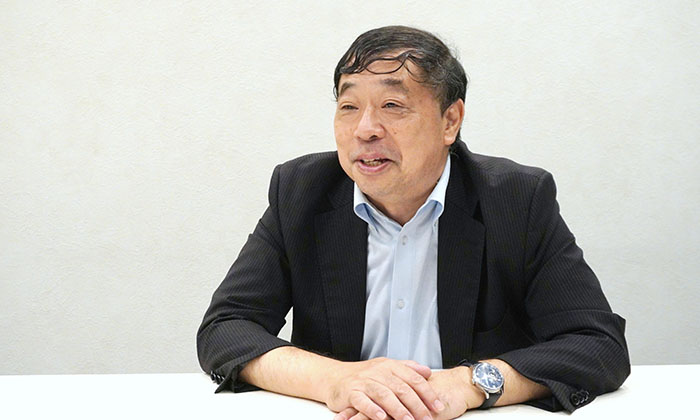
Founded in 2017 as a spin-off from Osaka University, CUORiPS Inc. is a regenerative medicine venture developing heart muscle cell sheets made from iPS cells (induced pluripotent stem cells). These cell sheets are expected to offer a new treatment option for patients with severe heart failure—particularly those suffering from ischemic cardiomyopathy—who currently have few choices beyond artificial hearts and other highly invasive procedures.The compa ny reached a major milestone in June 2023 with its listing on the Tokyo Stock Exchange Growth Market. Then, in April 2025, CUORiPS took another groundbreaking step by submitting a regulatory application to Japan’s Ministry of Health, Labour and Welfare for its iPS cell–based cardiomyocyte sheet—the first application of its kind in the world. This development has raised hopes for the therapy’s practical use in clinical settings. In this interview, Takayuki Kusanagi, President and CEO of CUORiPS, speaks with Osami Kono, Executive Officer and Head of Business Planning at Kyoto University Innovation Capital (Kyoto-iCAP), about the company’s progress, current challenges, and vision for the future of heart regeneration.
(Text: Mizuho Takita)
Please tell us about your background and how you came to be the president of CUORiPS.
I joined The Industrial Bank of Japan in 1981. As a returnee from abroad, I wanted to work in international business and was involved in asset management in the United States for a period of time. I thought that analyzing the stock market would become important in the future, so I worked as a stock market analyst at IBJ Securities and as a fund manager at DLIBJ Asset Management. Later, while working for an asset management company, I met Dr. Yoshiki Sawa, who developed iPS cell-derived cardiomyocyte sheets at Osaka University and founded CUORiPS with the aim of commercializing them (he is currently Director and CTO of CUORiPS and former Dean of the School of Medicine and Professor of Cardiovascular Surgery at Osaka University).
Were you introduced by someone?
He is a classmate of Dr. Sawa's and was my senior during my time at IBJ. When I heard that CUORiPS was aiming to treat heart failure using iPS cells, I did not know if such a thing was possible, but I decided to meet Dr. Sawa anyway. When I actually met and talked with Dr. Sawa, I thought he was an interesting person. I was convinced that I could do it.
Did something ring a bell?
Dr. Sawa has a wide range of knowledge and is not only a top-notch researcher, but I felt that his way of thinking is practical and he has good business sense. I had seen many different managers during my time as a fund manager, and I had a hunch that CUORiPS would definitely be able to go IPO with someone like Dr. Sawa. I told him I would love to work with him, and in 2020 I joined the company as a director, and in August of the same year I was appointed president and CEO.
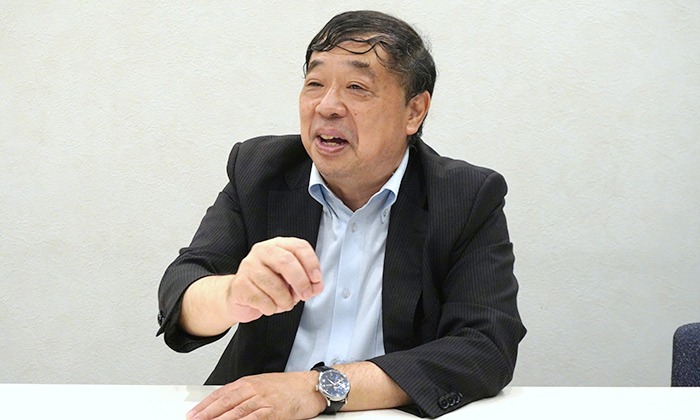
In June 2023, you were listed on the Growth Market of the Tokyo Stock Exchange. Did you encounter any difficulties?
I myself did not experience any hardships. I only had to finalize the rights with Daiichi Sankyo Company, Limited, with whom we were conducting joint research and development, and to develop our internal structure by focusing on recruiting excellent human resources. I think the IPO would not have been possible without Dr. Sawa's technology. However, it will take some time before cardiomyocyte sheets are put into practical use. As a manager, I am always aware of the importance of providing IR information on a regular basis to gain the trust of investors, including in other businesses such as CDMO (contract manufacturing organization for cell product development), which is contract manufacturing of cells from companies and universities.
Dr. Sawa was appointed CTO in 2021. How are the two of you working together?
I am an outsider in the field of science, so I leave everything to Dr. Sawa. On the other hand, he entrusts me with the management of the company, so I feel that we have a compatible relationship.
How do you feel about Kyoto-iCAP's support leading up to the listing?
We received the initial investment in 2018 and additional investment in 2020, and our research and development has made great progress.VCs not only invest, but also have an advisory function. Mr. Kono has overwhelming knowledge as a veteran bio-venture capitalist, so he was very reliable as a consultant.
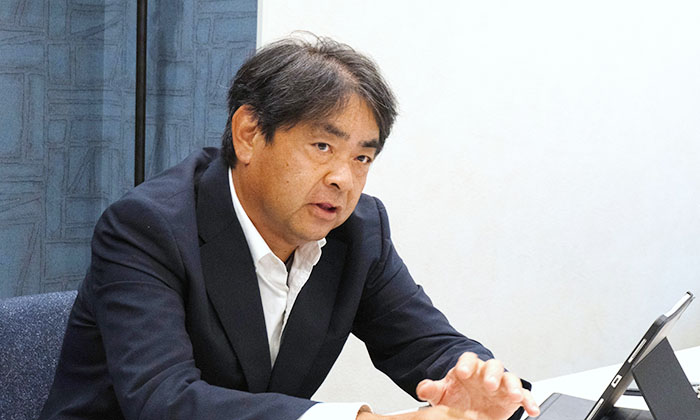
There are many companies in Japan and around the world that are trying to cure heart failure with the power of cells. What do you think is the technological advantage of CUORiPS?
One is safety: iPS cells are said to carry a risk of cancer, but in the investigator-led clinical trials that we have been conducting since 2020, there have been no cases of cancer. In addition, the only surgery required for this treatment method is to attach iPS cell-derived cardiomyocyte sheets to the surface of the patient's heart. Since the sheet is inserted through a small gap of about 7 cm, the burden on the patient and the surgeon is minimal. The sheets can be transported over long distances at normal temperatures. 8 clinical trials are underway from 2020 to 2023, and the postoperative course is consistently good and the efficacy has been proven.
In April of this year, you achieved the world's first application for manufacturing and marketing approval of iPS cell-derived cardiomyocyte sheets. Did you encounter any difficulties?
For me, there was nothing that I felt was particularly difficult. I think it went extremely smoothly.
When do you anticipate that the approval will be obtained?
We are aiming for the earliest possible date, targeting February 2026. For the manufacture of cardiomyocyte sheets, we have built a commercial culture and processing facility with our own research facilities in Minoh City, Osaka, and have established an integrated system from manufacturing to quality control. Myocardial cell sheets used in up to the third case of the clinical trial were manufactured at Osaka University, but the subsequent five cases were manufactured at our facilities.
The fact that your company's cardiomyocyte sheet has been designated as an orphan drug (regenerative medicine product for rare diseases) by the MHLW will probably accelerate the review of applications.
I have high expectations.
In addition to cardiomyocyte sheets, you are also conducting research on catheter-based therapies.
Together with medical device manufacturer ASAHI INTECC Co., Ltd. we are conducting research and development of a therapeutic technology to transplant iPS cells into the heart using an unprecedented new approach. Development is going very well, and we are aiming to start clinical trials around 2026 or 2027.
You are establishing a subsidiary, iReheart, in the United States in July 2024. What direction do you plan to take your business in the U.S.?
We are developing an improved iPS cell-derived cardiomyocyte sheet for deployment in the United States. This is a new product that requires less immunosuppressive drugs than the current cardiomyocyte sheet. We have signed a joint research agreement with the Department of Cardiothoracic Surgery at Stanford University to conduct a joint research program to transplant them into pig hearts, and are collecting data to be used for an investigational new drug application to the FDA (U.S. Food and Drug Administration). We have already had discussions with the FDA and are in the process of preparing to pursue clinical trials in the next few years. We are considering expanding the development of the drug from the U.S. to the entire world in order to make it applicable to a wider range of patients, not just those with severe heart failure.
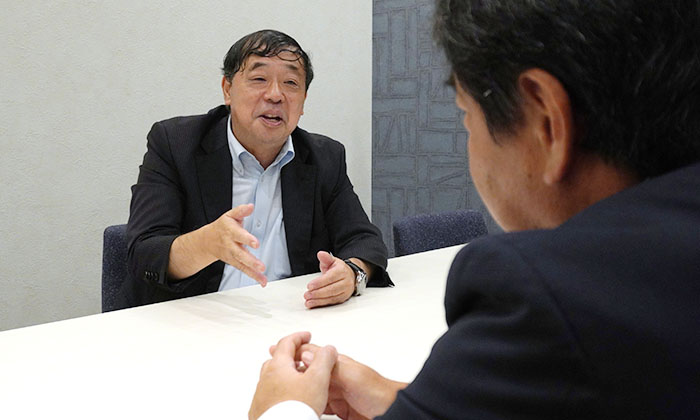
You exhibited iPS cell-derived cardiomyocyte sheets and miniature hearts at the Expo 2025 Osaka-Kansai. It was one of the highlights of the Expo, and was much talked about.
There was a very strong response from visitors. Dr. Sawa appeared on various TV programs to promote the cardiomyocyte sheet, and the fact that the sheet and the treatment method were widely known was also a factor in attracting the interest of many people. Many foreign dignitaries from Singapore, Thailand, Saudi Arabia, the Netherlands, and other countries visited the exhibit at the Expo and listened intently to Dr. Sawa's explanation. I believe that there will be a possibility to do business in cooperation with some of these countries.
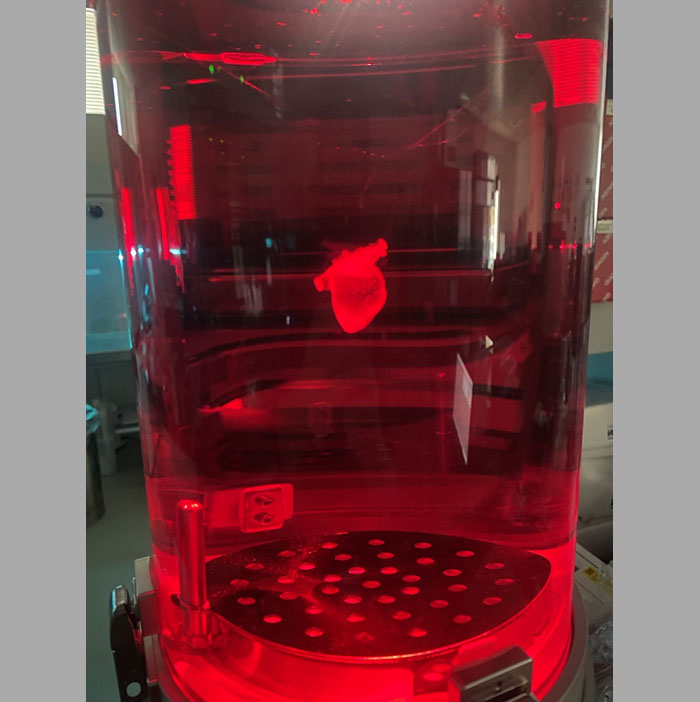
As a manager, what kind of company do you want CUORiPS to be in the future?
Our goal is to become the first Japanese biotech company that can compete on a global scale. To achieve this goal, we are looking to first obtain approval for practical use in Japan, and then use that as a lever to develop products that can be approved by the FDA. From there, we would like to further expand regenerative medicine centered on iPS in Japan and create an industrial cluster. We want to establish not only our company but also iPS itself as an industry. As part of this effort, we are currently engaged in the mass cultivation of iPS cells at Nakanoshima Cross (Osaka City), a center for regenerative medicine where research institutes, venture companies, and hospitals gather. I would like to make Kansai a hub for biotechnology to revitalize the region and strengthen Japanese industry.
(Interviewed in August 2025. Affiliations, positions, etc. are as of the time of the interview)
CUORiPS is the first company in the world to file for regulatory approval for regenerative medicine using iPS cells. The company was listed on the TSE Growth Market in June 2023 and has begun to expand its business to the U.S. using the funds raised. The company has also begun to expand its business to the U.S. using the funds raised.
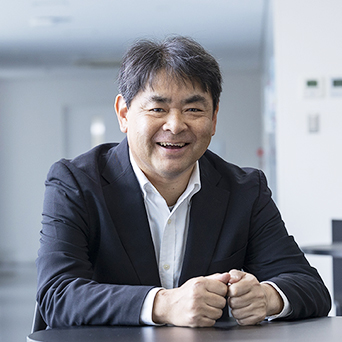
Osami Kono

CUORiPS Inc.
Please feel free to contact us if you have any questions or concerns.
Inquiry Form